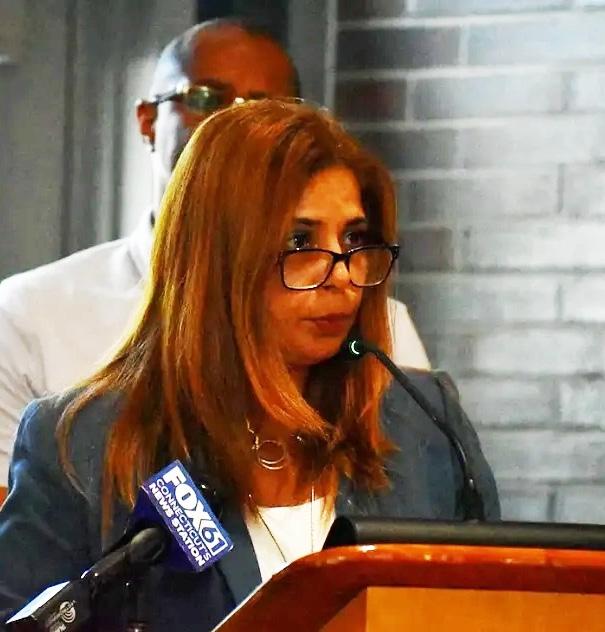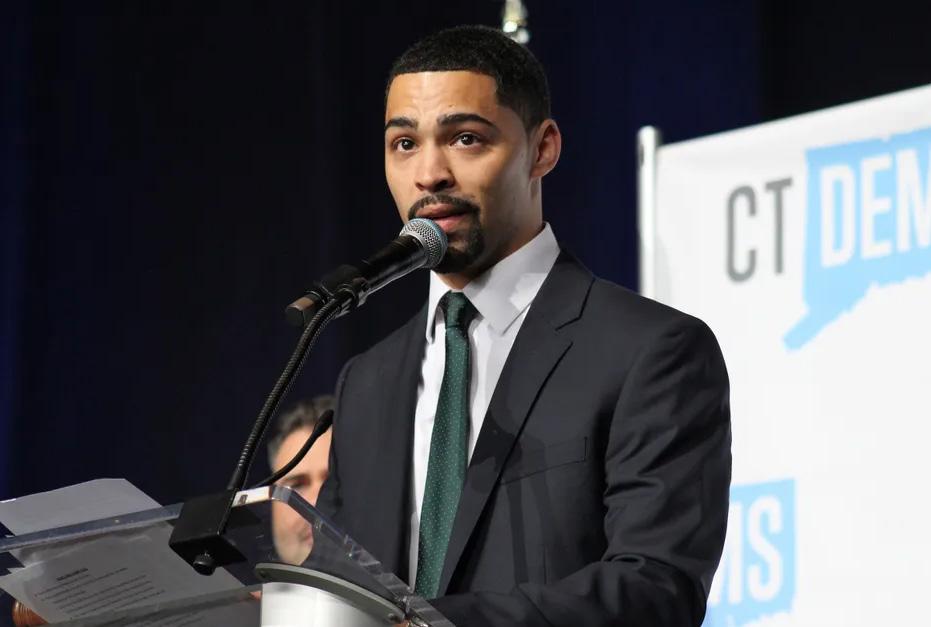








by Jamil Ragland
HARTFORD, CT
– Dozens of pro-Palestinian activists from across the state and beyond gathered in front of the state capitol on Sunday morning to renew their call for a ceasefire in the Gaza Strip and to de-escalate the recent hostility between Iran and Israel, which is supported by the United States.
Led by the Community Alliance for Peace and Justice (CAPJ), several organizations came together, including activists from Muslim Advocacy for Rights, Unity, and Fairness CT; Veterans for Peace CT; the Connecticut Palestine Alliance; the Green Party of Connecticut; CT Labor for Palestine; Healthcare Workers for Palestine; and the Sumud Coalition at Yale.
Jim Brasile of Veterans for Peace CT addresses the pro-Palestinian rally at the state capitol building Sunday, June 29, 2025. Credit: Jamil Ragland / CTNewsJunkie
The coalition is demanding an immediate ceasefire in Gaza. They also described the US strikes on Iran as unprovoked and illegal and called for a halt to military escalation and no further US strikes. The groups also called for a full congressional investigation into the strikes and urged Congress to pass the war powers resolution introduced by Sen. Tim Kaine, D-VA, to limit future strikes.
CAPJ board member Shafi Ahmed stat-

ed that US weapons continue to fuel Israel’s war in Gaza, where tens of thousands of people have been killed. Ahmed also claimed that President Donald Trump’s strike on Iran bypassed Congress and endangered millions of lives, including those of US service members.
“I stand here today as a human being, a father, and an advocate who refuses to stay silent in the face of genocide and reckless warmongering,” he said. “Meanwhile, our government continues to fund Israel’s atrocities in Gaza while ignoring hunger, homelessness, and a crumbling healthcare system here at home. This is not just politics; it’s about human life.”
In addition to rallying for peace, the gathering served as a reminder of the potential for change through electoral politics.
Louai Abu-Osba, a Palestinian-American organizer with the Western Mass Coalition for Palestine, celebrated the recent victory of Zohran Mamdani in the New York City Democratic primary for mayor as an example of progressive policies carrying the day.
“Every small success is a seed for a larger one,” he said. “Once we have a progressive majority in the state legislatures, in Congress, in the governors’ mansions, and in the White House, we will be able to dismantle the stranglehold that war profiteers have over our government and foreign policy. When war profiteering ends, we get money for everything else.
Universal health care, education, housing, foreign policy driven by human rights, and eventually a free Palestine, from the river to the sea.”
Roxanne Bruno, board secretary for CAPJ, was the final listed speaker and chose to end the rally with a message of hope. She recalled her time as an animal rights activist in the 1980s and how much of an uphill battle that was. But she pointed out that small victories compounded and the world is now more aware of the cruelty and suffering that animals endured, which has led to real change. She also said that the tactics used back then could be useful now as well.
“This is a lesson also from animal rights: that one of the most powerful tools that we have is the dollar in our own wallet and the way that we choose to spend it,” she said. “Educate yourselves. Understand how your dollars are profiting someone. And do you want to profit those people? That is one of the most powerful tools we have.”
As protesters waved Palestinian flags, she told the crowd not to give up.
“When it’s completely dark, it is better to hold one small candle or one match than to remain in the darkness,” she said. “And when we all do that, we do change the world.”

By Lucy Gellman, Editor, The Ars Paper arts-paper.org
The sound of drums soared across the New Haven Green, a singsong call-andresponse beneath Gammy Moses’ outstretched palms. At first, it was quiet, a suggestion of something not quite reachable. Then it took shape, resonant and round from the stage. From a few yards away, Amanda Byam let herself lean into the sound, putting the final touches on a table dedicated to the island of Grenada.
If a person closed their eyes, they could see the late Elaine Peters beaming from ear to ear, watching from the front row in a gem-colored, gauzy blue top. Within moments, she was everywhere—in the warm summer breeze, the sound of the drums, the laughter bubbling up from the youngest dancers in the grass.
A jubilant, sometimes-sacred and vibrant sense of community flowed through the 11th annual Caribbean Heritage Festival on the New Haven Green Saturday, as vendors, artists, and cultural educators gathered to celebrate the breadth of a diaspora under a bright summer sun. Held in partnership with the International Festival of Arts & Ideas, it included both a festival and a closing concert, with Haitian performer Joel El Chèlbè and headliner Nadia Batson. Batson, a soca phenom who hails from Trinidad and Tobago, is the first Caribbean woman to headline on the Green. By the time she came to the stage Saturday evening, thousands had filled the Green to hear her, some wrapped in the flags of their home countries as others waved handkerchief-sized bandanas. As it has for the past three years, it closed Arts & Ideas with rafter-raising, joyful noise, a testament to the diversity from which New Haven draws its strength.
In keeping with its history—which has braved a global pandemic and traveled from City Hall to Goffe Street Park to the New Haven Green—the festival took place at the end of June, which President George W. Bush named Caribbean-American Heritage Month in 2006 (it was introduced by U.S. Rep. Barbara Lee).
“With everything that is happening, it is more important that we all come together to realize that we are more similar than we are different,” said festival co-founder Karaine Smith-Holness, who launched the festival in 2013 at City Hall (she is also the beloved owner of Hair’s Kay and president of the Jamaican American Connection, or JAC).
“We're able to come together and dance to the same beat. Listen, they can't stop us if we hold true to the fact that we are all in this race together.”
“I think because we come from small islands, sometimes we don't know that we all are here,” added Edmonds, a daughter of Dominica (“which is not in Jamaica” and is not the Dominican Republic, she said several times Saturday) who has been part of the festival since 2014. “This is a space for us to come together in one spot, to introduce ourselves to each other.”
“There are also people who have been in New Haven a very long time, who may never be able to go to the Caribbean,” she added. “And we bring it to them.”
That sense of cultural exchange was everywhere Saturday, from vendor tents and educational booths strung up with flags, instruments and photos to a humming row of food trucks that lined Temple Street. At one edge of the setup, New Havener Mosi Moses greeted passers-by at a table covered in different drums, eager to chat about her native Dominica. Rocking wide black pants with a bright, peach-colored madras trim,she laid her hand on the side of a tambora, her palm sliding against the smooth, light wood.
“How much are these?” an attendee asked as she stopped by the table. She eyed a large black djembe, with a thick, ornate band of undulating waves carved around the body.
“Oh! They’re not for sale!” Moses answered gently, as if it was a reminder of how precious and intangible cultural heritage can be. She later motioned toward the stage, explaining that the drums belonged to her brother.
Raised for the first half of her life in Dominica, Moses moved to New Haven in 2005. Even as she’s made the Elm City her home, she works to teach people about the “hidden gem,” where mountains and dramatic, lush rainforest regions rise up from the iridescent waters of the Caribbean Sea.
Beneath the drums and percussion instruments, which belong to her brother Gammy, she had laid out a light madras tablecloth, showing off the pattern that has become synonymous with Dominica itself.
“It’s so diverse and people need to be exposed to it and share it,” she said.
She turned to continue a conversation with Johanelyz Arroyo, a rising senior at James Hillhouse High School who was named Miss Puerto Rico of Greater New Haven earlier this year. Arroyo, who was representing Cabo Rojo with a shell-studded gown, said that she’d first thought Moses was talking about the Dominican Republic. She was grateful that she now knew the difference.
Moses smiled: that’s part of the reason she does this work. The two countries may be bound by a diaspora, but their histories, their cultures, their foods each have their own unique identity.
Back on the stage, Gammy Moses paused for a moment to remember Peters, who was a fixture at the festival. In the early 2000s, Peters worked closely with Moses’ father, Delmance “Ras Mo” Moses, to host the “All City Carnival” in the summers.
When she heard that the city was starting a Caribbean Festival in 2013, she called up Smith-Holness and got involved. For years, she’d come ready to teach attendees about Barbados, in a tribute to her own Bajan heritage.
Now, Moses said, the rhythm of his drums belongs to her, at least some of the time. As dozens of conversations rose and fell beyond the stage, he looked down at his djembe, letting everything else dissolve as he held it between his kneecaps. Beneath his outstretched hands, the notes were ethereal, light enough to seem bird-like. A beat, and it seemed as though they were carried by a human voice. Moses, who often brings spoken word and poetry to his work, let the drum speak entirely for itself
As they listened, friends Samantha Murray and Jacqueline Torres spread out on the



grass, letting their little ones dance to the beat. Before Saturday, Torres said, she had no idea the festival was happening—but when she saw it on the Green, she went home, changed her outfit, and came back with her three-year-old son, Israel. In her home, the Caribbean influence is strong: Torres is Puerto Rican, and her husband is from Haiti. As a mom, it’s important to her to pass both of those cultures onto the next generation.
“I think it’s always good to remember your roots and where you come from,” she said. Murray, who had brought her young sons Casimir and Azriael, agreed. She loves chances for them to learn about different cultures, especially those that make their home city the diverse and polyphonic place that it is.
At a red-and-black festooned tent nearby, Stacy Samuel and members of the TrinBago Crew set out mango and apple sodas, squat jars of pepper sauce, and well-loved volumes of folklore, the covers faded but still bright. On a red tablecloth, a miniature sculpture of a steel pan sat perched on an equally miniature easel. Behind it, a halffull bottle of Puncheon rum peeked out like an invitation.
“Trinidad has come a very long way,” said Benesson Andrews, president of the crew. He pointed to a tiny version of the steel pan pinned to his shirt, a tribute to the country’s long history of resistance and its hard-fought journey to independence. Behind him, Samuel and Michelle Cave set out containers of barbecue chicken, corn pie, and potato salad. “It’s very important to get our name out there.”
That’s something Andrews knows firsthand. Born and raised in Morvant, in the north of Trinidad, he learned to play steel pan in school, soaking up both its sound and its history. In 1999, he immigrated to Hartford, where he’s lived ever since.
Despite the miles that separate him from the West Indies, he teaches that culture and heritage through food and the arts, including music, whenever he can. While he no longer plays pan himself, he spends time traveling to listen and document it, particularly in New York’s vibrant Caribbean communities.
“This is to share our culture with everybody,” Samuel chimed in as she gestured to dark, carefully wrapped balls of Toolum, a sweet, gently spiced Trinidadian treat made with grated coconut, molasses, orange peel, and ginger. Beside her, Andrews pointed out cool jugs of lemonade and mauby, a drink made from spices and boiled tree bark that takes on a deep red hue, somewhere between oxblood and ruby. Back on the stage, dancer Kyndal Rice seemed to float through the warm air, her arms flying out to the sides as she extended a leg, and began to spin. A rising senior at Sacred Heart Academy, Rice has known Smith-Holness for her whole life through her mom, Paula (“she knew me before I was even born,” Rice said after performing, as she took a swig of water). The festival is an annual tradition.
In some ways, Rice has watched the fes-
by Laura Glesby
There was a piece of 17-year-old Camryn “Mooka” Gayle in everyone on Harding Place who danced, cried, burst into laughter, and cheered on her name on Saturday afternoon.
“I see her in each and every person that’s out here,” said Gayle’s mom, Elizabeth Robinson, beneath the newly-unveiled corner sign bearing her late daughter’s name.
Gayle was a bright, bold, silly, fiercely loyal friend and talented dancer who died in a car crash during her senior year of high school in 2021.
In the years since her death, Gayle’s friends and family have thrown annual block parties at the site of the crash, the intersection of Harding Place and Sherman Parkway. They wear yellow, in honor of Gayle’s favorite color. They revive the joyful spirit she carried wherever she went.
On Saturday afternoon, they closed down the block once again to reveal a new street sign naming the intersection “Camryn’s Corner.”
The corner name was the culmination of a years-long effort championed by Robinson and Gayle’s close-knit group of friends, including Shyan Dawson a survivor of the car crash and her aunt, Roxanne McCabe. The Board of Alders voted to name the corner after Gayle in April.
Robinson is still fighting for traffic calming measures, such as speed bumps, along the road where her daughter’s car crashed.
But the sign with Gayle’s name, she said, brought a sense of relief. “I’m overwhelmed… I’m just so happy.”
Though tears flowed on Saturday afternoon, the gathering of 50 or so people was far from somber. There were hot dogs, a DJ, bright yellow balloons, children running around, peals of laughter.
Gayle loved to dance: she studied the art form at Co-Op high school, she performed as a cheerleader at Hillhouse, she was a praise dancer at Thomas Chapel Church, and she loved to rope her family into making dance TikToks. So as R&B filled the block, along with a haze of barbecue smoke that seemed almost like a fog machine, her friends turned Harding Place into a dance floor.
Latoyia Gallimore, a cousin of Gayle’s who helped raise her, recalled how the two of them used to sing and dance to Mary J. Blige and Beyonce’s



“Love a Woman.”
“We both wanted to be Beyonce,” Gallimore said. She laughed. “She said I had to be Mary because I was too old!”
“She always wanted to be Beyonce,” chimed in Tawana Rambert, another cousin of Gayle’s who helped bring her up. “She was a bundle of joy. She wanted to have fun every day … She would be so happy that this was happening for her.”
Gayle left behind a group of friends and loved ones who now call themselves RMG (short for Real Mooka Gang), organizing basketball tournaments in her memory and traveling in her honor.
Alternately blinking back tears and jumping up to dance to Gayle’s favorite songs, Gayle’s friend Shyan Dawson corralled the group together to share memories and stories.
“She’s the person that’s always gonna be your cheerleader,” said April Artis, recalling when Gayle got a cake and a card for Artis’ last high school basketball game playing for Wilbur Cross.
“She made sure everybody got home safe,” said Daniya Cox. “She’s our keeper for real.”
“We would laugh about everything,” said Joli Boria, who grew up with Gayle ever since they were six and seven years old. “One time, it was so quiet at my mom’s house. The chairs kept squeaking… We just stared at each other and busted out laughing.”
Boria’s two-year-old son was born one year to the day after Gayle’s funeral; Boria named him Caleb Camryn after her best friend.
“She’s fearless. Really, really brave. He’s the same way,” Boria said.
At 5:30 p.m., everyone gathered around the sign, which had been encased in brown paper attached to a dangling string. Dozens of cameras started to record. Gayle’s mom and best friends tugged hard on the string. The paper fell. The words “Camryn’s Corner” came into view. And the crowd cheered, loud and with love, like Mooka always did.

John P. Thomas Publisher / CEO
Babz Rawls Ivy Editor-in-Chief Liaison, Corporate Affairs Babz@penfieldcomm.com
Advertising/Sales Team
Keith Jackson Delores Alleyne John Thomas, III
Editorial Team
Staff Writers
Christian Lewis/Current Affairs
Anthony Scott/Sports Arlene Davis-Rudd/Politics
David Asbery / Tanisha Asbery
Jerry Craft / Cartoons / Barbara Fair
Dr. Tamiko Jackson-McArthur
Michelle Turner / Smita Shrestha William Spivey / Kam Williams Rev. Samuel T. Ross-Lee
Contributors At-Large
Christine Stuart www.CTNewsJunkie.com Paul Bass www.newhavenindependent.org
National Association of Black Journalist National Newspapers Publishers Association Greater New Haven Chamber of Commerce Greater New Haven Business & Professional Greater New England Minority Supplier Development Council, Inc.
The Inner-City Newspaper is published weekly by Penfield Communications, Inc. from offices located at 50 Fitch Street, 2nd Floor, New Haven, CT 06515. 203-3870354 phone; 203-387-2684 fax. Subscriptions:$260 per year (does not include sales tax for the in State subscriptions). Send name, address, zip code with payment. Postmaster, send address changes to 50 Fitch Street, New Haven, CT 06515. Display ad deadline Friday prior to insertion date at 5:00pm Advertisers are responsible for checking ads for error in publication. Penfield Communications, Inc d.b.a., “The Inner-City Newspaper” , shall not be liable for failure to publish an ad or for typographical errors or errors in publication, except to the extent of the cost of the space in which actual error appeared in the first insertion. The Publisher reserves the right to refuse advertising for any reason and to alter advertising copy or graphics deemed unacceptable for publication. The entire contents of The Inner-City Newspaper are copyright 2012, Penfield Communications, Inc. and no portion may be reproduced by any means without the written permission of the publisher.

tival grow up with her, she said. The first time she took the stage, she was still in elementary school, and the festival was still in Goffe Street Park. Now, she’s getting ready to apply to college, and it has moved it downtown with new creative partners like the Shubert Theatre and Arts & Ideas. Along the way, Rice has taken on new dance opportunities, like classes with the Alvin Ailey Dance Theatre.
“It feels amazing,” she said. When Rice takes the stage, she carries the stories of her maternal grandparents, who came to the U.S. from Jamaica decades ago. Every Sunday, her family still makes time to see them at their home in Bridgeport. Her goal, she said, is to honor them—and to push herself—through her craft.
“I practice every day, and it’s really helped me evolve.”.
In the grass, someone had gotten a bubble machine going, and the huge, soapy orbs filled the air, prisms of light bouncing off their sides. On one side of the stage, a giant, flame-hued pair of wings peeked out from a tent dedicated to Mas, or the tradition of masquerade during Carnival. An approving squeal went up as Isonnette Grace O’Brien posed against them, feeling their weight on her back.
A princess with Miss Puerto Rico of Greater New Haven, O’Brien soaked in the moment, letting herself listen to the laughter around her, the soca beats now drifting from a DJ on stage. A rising senior at Common Ground High School, O’Brien is both Puerto Rican and Belizean, and grew up feeling like she didn’t belong to either culture. Fellow Boricuas told her she wasn’t Puerto Rican enough (“People called me a Fake-o Rican,” which was incredibly hurtful, she remembered). Belizeans told her she wasn’t Belizean enough.
But Saturday, she was right where she was supposed to be. Nobody questioned her right to be there. In a long red dress and tiara, she told other attendees about Bayamón, as known for its love of crispy, flavorful Chincharrones, or fried pork rinds, as it is for the arts and sciences. Every few minutes, she made her way from one booth
to the next, often shoulder-to-shoulder with other members of Miss Puerto Rico of Greater New Haven.
“I feel very proud to show people that Puerto Rico is part of the Caribbean,” chimed in Junior Miss Puerto Rico of Greater New Haven, Sophia Olivia Quiñones. Earlier this year, she won the title while representing Sabana Grande, known for its dozens of prodigies—”poets, comedians, actors, singers,” she said—and its rivers. Saturday, she showed off a dress meant to represent that history, designed at home with her dad.
With fellow pageant contestants Chloe Rivera and Eddielyz Domenech, she made her way from one table to the next, soaking up information as she did. At a booth for Guyana, she took in a game of island jeopardy, written to teach attendees about the small island country one question at a time(do you know what the most popular sport in Guyana is?).
Before the festival, New York transplant Aralia Heggs had come up with the questions, splitting them into categories like “food” and “trivia.” Saturday, she said that she’s always excited to share knowledge about the country, whence her dad comes.
“I feel so proud [to be Guyanese],” said Heggs, who moved from Queens to Stratford four years ago to afford a bigger home for her three children. Growing up in New York, her dad made sure she knew about her roots, from food to games of cricket to soca music that reliably gets her dancing.
When she heard about the Caribbean Heritage Festival, she knew that she wanted to participate—especially when she found out that there wasn’t a Guyana booth. She enlisted the help of Kadijah Nicholson, a fellow New York transplant who is also Guyanese, and met Heggs through her partner. “It’s cute and simple,” Nicholson said of the game.
Just one tent over, Amanda Byam and her mom, Barbara Byam, put the finishing touches on a table dedicated to the island of Grenada, which also has not had previous representation at the festival. Joining the festival felt natural, they said: Barbara grew up in Trinidad and Grenada, and loves sharing that history with friends and family.






“For me, it’s an honor,” said Amanda, communications manager and board liaison at Common Ground High School. Growing up in Brooklyn, she learned the culture through her parents, from curried chicken, saltfish, Pelau and oil down to music that filled their home.
“I often feel a responsibility to represent something bigger than myself,” she said. “In the Caribbean, we’re a loud voice, and we’re very bright and vibrant, but sometimes we lack representation.”
As she walked between stations, attendee Deborah Pullen said it was good to be back after several years away. While she’s not Caribbean herself, her children are Jamaican, through their father. She’s always held on tightly to the importance of teaching them about the island that half of their family comes from.
Those lessons feel particularly urgent this year, she added, as she watches attempts at cultural erasure from both individuals and from the federal government.
“It’s extremely important,” she said. “I think culture is being cancelled. To keep culture alive, we have to show up. We don’t need other people to tell us who we are.”
It echoed something Smith-Holness said in a phone call Monday morning, when asked how the festival feels against an increasingly anti-immigrant backdrop. In the future, she dreams of having a portion of the event related to diasporic foods, like curry and rice and peas that differ from country to country.
In Jamaica, for instance, rice and peas might be made with coconut milk, scallions, kidney beans and scotch bonnet pepper. But in the Dominican Republic, they are Moro de Habichuelas, scented with different spices and diced green pepper. In Haiti, the same dish becomes riz et pois rouges.
People are the same way, Smith-Holness said: they may have different stories of migration, but share a common humanity.
“You cannot cook with just one seasoning!” Smith-Holness exclaimed. “Not just salt. Not just pepper. You need a blend to be the best that the meal can offer.”








































by Maya McFadden
(Updated) The Board of Education took a final vote Tuesday on a $220.7 million budget for the fiscal year that started Tuesday.
That now-approved fiscal plan will see the school district close Brennan-Rogers School and eliminate 76 teacher and central office positions, all in an effort to mitigate the budget deficit and avoid layoffs.
The Board of Education voted 6 – 0 in support of that Fiscal Year 2025 – 26 (FY26) budget during a special meeting that took place at John C. Daniels School in the Hill. Supt. Madeline Negrón and school board members repeatedly said that this budget legally must be balanced.
The only Board of Education member not to vote in support of the final budget plan was Andrea Downer.
Instead of voting against the proposal, however, Downer abstained from a vote altogether. “I believe this could’ve been prevented,” Downer said about the closure of Brennan-Rogers School in particular.
The school board meeting took place 45 minutes after Negrón, Board of Education President Orlando Yarborough, and Mayor Justin Elicker hosted a press conference at John C. Daniels School to speak about the FY26 budget plan.
It also took place several hours after Elicker announced his plans to propose sending $3 million more in city funds to the school district, on top of the $5 million bump already included in the alders-approved budget for the fiscal year that started Tuesday.
The now-approved NHPS budget closes Brennan-Rogers School due to its declining enrollment, eliminates 76 vacant teacher and central office positions, reduces funding for athletics-related travel, and makes a number of other cuts in order to avoid a previously pitched plan to lay off up to 129 student-facing school staffers. Negrón first proposed this plan to the school board a week ago.
Negrón said that all staff displaced by the elimination of these positions “have been placed within the district.” She also acknowledged that each cut “will have consequences.”
A few of those consequences include larger class sizes and fewer elective classes for high schoolers next year. Negrón noted that there will be no cuts to advanced placement (AP) courses.
She said that the hardest decision to make for this budget was closing Brennan-Rogers. “This is a proposal that I had hoped not to make on short notice,” she said, adding that she hoped to have more time to consult with the community and educators.
She again noted that a special lottery will be conducted for Brennan students to pick the next school they attend. She also said that “we have enough vacancies to absorb the Brennan staff elsewhere in the district.”
Yarborough he explained that because New Haven’s schools budget relies predominately on property taxes, and because roughly half of all property value in the city is off the tax rolls, the push must con-

tinue for the state to keep up with inflation and invest in school districts equitably.
While Covid relief funding made up for that gap in recent years he said, the drying up of those federal funds is the cause for the district’s decisions to make “incredibly painful cuts.”
Yarborough also said that the mayor’s proposal to send another $3 million in city funds to the school district “should enable us to avert layoffs and leave us with a very small gap that Dr. Negrón believes she can close over the school year.”
That means if the city boost is approved by alders, the district will be left to mitigate $800,000 this school year rather than the $3.8 million hole that it’s currently left with after approving the Tuesday’s budget plan.
Elicker noted that the formal $3 million bump will be submitted to the Board of Alders on July 7.
Before Tuesday’s school board vote, members of the community spoke up during the public testimony portion of the meeting to share concerns about the accuracy of NHPS’ recently released budget breakdown.
School staff questioned why the document does not reflect the district’s most recent “right-sizing” efforts, which cut staff positions at nearly all schools throughout the district.
Testifiers also urged the district to begin working on next year’s budget immediately rather than waiting until the last minute. Negrón confirmed Tuesday that that is her goal.
Brennan-Rogers family resource center site coordinator Amber Green spoke up Tuesday about her own experience as a New Haven native attending schools like Timothy Dwight School, which was closed down while she was a student, causing her to later attend Wexler (which is also closing this year to merge with Lincoln-Bassett).
She recalled her goal after graduating from Yale University to return to NHPS to support students and families through challenges she recalled facing in her youth. Now, however, Brennan’s family resource center will close along with the school.

“The family resource centers which are directly funded by the state are being attacked,” she said. “I worked this program as a 16-year-old counselor ten years ago, and I looked forward to giving back to my community. But now the New Haven school system has left a very nasty taste in my mouth.”
After the Tuesday vote, several Brennan-Rogers staff in attendance shed tears and last hugs with their colleagues.
While wiping away tears, Brennan kindergarten teacher Kristin Kazakewic said, “I think this was pre-planned and could’ve been handled a lot differently.”
She described feeling angry and heartbroken by the district’s lack of transparency with the budget and Brennan’s abrupt school closure.
She argued that Brennan staff, students,
Teachers Vice President Jenny Graves said, “I’m heartbroken for the Brennan Rogers C.R.E.W. and the entire West Rock community. Brennan Rogers wasn’t just a building, it was a family, a solid support system, and a community of joy and love. But, this is what decades of disinvestment looks like. Why wasn’t Brennan Rogers rebuilt when all other schools were? Why was 21 Wooster Pl prioritized over a new HVAC system for Brennan Rogers? Couple that with the farce of school choice and the need to leave your own neighborhood to go to a ‘better school’ across town. New Haven needs to completely overhaul how we view, build, and sustain our schools or we will continue to repeat these harmful decisions.”
In response to concerns about NHPS’ newly released budget breakdown, Negrón told the Independent after Tuesday’s meeting that that document does have errors and does not include the Brennan-Rogers closure as well as several other last-minute budget mitigation efforts by her team.
“Because that was done manually, I just learned that there are some errors. We just pulled it. That’s why I didn’t want to publish it,” she said. “We need an automated platform to do it. Manual stuff opens the door for error and doing it in a rush.”
After Tuesday’s meeting, the Independent also asked Negrón why she did not recommend a similar budget to last year’s, which did have a $2 million budget deficit from the very start. “I cannot speak for the board,” she replied. “I do know that the board wants to get to a balanced budget. So again I cannot speak for them. The only thing I can think of is we already know the very difficult cuts that we made last year, and now cuts again, so maybe that.”
The Independent asked Negrón the total budget number for the budget approved on Tuesday. She said she did not know, and encouraged this reporter to reach out to the district’s spokesperson. (Update: On Wednesday, as noted above, Harmon told the Independent the final budget figure was $220.7 million.)
and families should have been given the chance to say their goodbyes before the end of the school year. “I would’ve been able to at least give my kids a proper send off,” she said.
She said she next expects to be contacted by human resources to begin the new placement process for next school year.
“Does that mean we’ll be happy in those openings? No, because for some of us it was more than a job at Brennan,” she concluded.
As staff hugged after Tuesday’s meeting, they reminded each other, “We’re going to be Brennan strong whereever we go.”
Brennan Principal Kim Daniley thanked staff outside of John C. Daniels and told them, “We’re going to get through it for our kids.”
In a separate comment provided to the Independent, New Haven Federation of
When asked if she expects a budget increase to transportation costs next year due to Brennan’s closure, Negrón said the majority of students attending Brennan were already being bussed there due to only 34 percent of students attending living in the neighborhood. “I don’t expect a huge increase there,” she said.
The Independent also asked whether the district made any efforts to increase Brennan’s low student enrollment over the years before deciding to close the school. Negrón said, “Every year to my knowledge, every year Brennan has been treated the way all of our magnet schools are treated.”
She concluded Tuesday that “it’s been a really difficult process. I wish I did not have to be the superintendent that needed to mitigate. Every cut, even though I know I saved layoffs, it’s still an impact to our kids. We should be adding positions not cutting positions.”
by Laura Glesby
Ashley Bailey doesn’t remember living at 470 Howard Ave., where her father and grandfather raised her briefly as a baby.
But her 13-year-old daughter will remember painting her bedroom walls teal inside that same house now that Bailey is on track to purchase it as a firsttime homeowner, with the help of state and federal programs that are in jeopardy under President Donald Trump.
She and her daughter, London, convened for a press conference at the house on Friday afternoon with U.S. Rep. Rosa DeLauro, Neighborhood Housing Services of New Haven staff, and state housing advisor Shanté Hanks to call on Congress to avoid erecting more barriers to homeownership.
Trump’s proposed 2026 budget would cut $32.9 billion from the federal Department of Housing and Urban Development (HUD), according to Housing Wire. The budget would endanger funding for organizations like Neighborhood Housing Services, including by underfunding NeighborWorks America and completely eliminating the HOME Investment Partnership and Community Develop Block Grant programs.
Those grants, according to Neighborhood Housing Services (NHS) Director Jim Paley, were critical in funding the organization’s rehabilitation of 470 Howard Ave. and its ability to sell the home at a subsidized rate to Bailey.
Also at stake, DeLauro said, are the costs of borrowing money to buy a home.
According to the Congressional Budget Office, Trump’s “Big Beautiful Bill” (as passed by the House) would add $3.3 trillion to the national debt — which “drives up the interest rates for every-

one else” and “makes borrowing to buy a house more expensive,” DeLauro said.
A Yale Budget Lab model found that as a result, for a median-priced home, annual mortgage interest costs could increase by about $1,060 in 2030 and about $5,800 by 2050.
“These higher debt levels are going to severely limit whether people qualify for mortgages,” added NHS Managing Director Bridgette Russell.
Between those interest impacts and HUD funding cuts, homeownership could become more and more out of reach for many Americans.
“I will fight,” promised DeLauro, for lower debt and more housing funding as the Senate takes on the legislation not-
ing that homeownership opportunities affect households across the political spectrum. Now is the time, she said, to “stand up and speak up” about the stakes.
Homeownership is “a source of comfort, pride, and success” for a family while building a “foundation of safe and stable neighborhoods.”
In an alternate universe in which those bills passed before Bailey could buy her home, she might have been impacted as well.
But with the help of Neighborhood Housing Services, she’s reached a mortgage agreement and is in the process of buying the home for $325,000. She plans to live on the first floor with her daughter, while renting out the top two
floors as two three-bedroom apartments.
“Now I have something I can pass down to my daughter,” said Bailey, a lifelong New Havener who works as a retail specialist at the Yale Schwarzman Center.
NHS acquired the home from another housing nonprofit in 2022 and then spent years restoring the historic Queen Anne-style home to a more habitable state, preserving artistic wall accents, ornate wood and tile floors, and a regal wooden staircase. The rehabilitation was made possible by some of the federal grants now in jeopardy, such as CDBG, though NHS declined to say how much was actually spent on that process.
Meanwhile, Bailey spent years work-
ing with Russell on a financial plan, building up her credit and reducing debt. “Their support has been invaluable,” Bailey said of NHS. She found assistance from the state’s Live Where You Work and Time To Own programs, CHFA, the Greater New Haven NAACP, and more, cobbling together about $93,000 in assistance to purchase the house.
NHS has helped about 300 families buy homes in New Haven over the course of more than four decades, according to Paley.
One of those first-time homeowners will be Bailey’s future neighbor, Truman Street resident Leslie Radcliffe, who stopped by to introduce herself to Bailey on Friday.
“Thirty years ago, I went through this same process,” she said. “I’m in this neighborhood.” She gave Bailey her phone number and told her to call with any questions or concerns she encounters upon moving in.
“As a homeowner, you become a stakeholder,” Radcliffe later commented, expressing hope that each new homeowner in the neighborhood will become another long-term voice invested in improving community life.
Walking through her future home, Bailey said she’s excited to have a backyard, since she and her daughter currently live in an apartment complex without any outdoor space. She especially loves the “attention to detail” across the home the scalloped window borders, the colorful tiles by the old fireplaces, the floral flourishes carved into the staircase.
Her daughter, London, is excited to peer out the window of her (hopefully teal) bedroom overlooking the backyard, and see a lawn of fresh grass she can call her own.
“I’m excited to decorate,” she said.
By David Asbery
Some nights are unforgettable, and this past Saturday at New Haven's Shubert Theater proved to be one of them. Marlon Wayans graced the stage with his Wild Child tour, and for those lucky enough to snag a seat, it was an evening that reignited a love for comedy in its purest form.
From the moment Marlon stepped onto the stage, the energy in the room was electric. His charisma and natural comedic timing had the audience hooked within seconds. The show felt like a throwback to an era when comedy wasn’t just about the laughs, but also about connection and self-reflection. We laughed at Marlon, we laughed with Marlon, and, perhaps most importantly, we laughed
at ourselves. None of it felt forced or mean-spirited, and at the end of the night, no one needed to worry about being “canceled.” It was refreshing to experience comedy that walked the line of edgy and meaningful while staying inclusive and respectful. Marlon touched on some daring topics, the kind that makes you squirm for a second before cracking up because, somehow, he turns even the most sensitive moments into relatable hilarity. Without giving away too much (you’ll thank me later), he skillfully weaved social commentary into humor that brought the house down.
The Shubert Theater, with its historic charm and intimate atmosphere, was the perfect venue for this kind of show. The crowd was diverse, energetic, and entirely in on the fun, amplifying the

communal charm of the evening. It was a reminder of how comedy can bring people together, erasing divides, even if only for a couple of hours. And here’s the best news for anyone who missed out on seeing Marlon in New Haven—this isn’t goodbye. This performance is set to become an HBO special, and trust me, it’s one you won’t want to miss. Whether you’re a long-time fan or new to Marlon Wayans’ work, the Wild Child tour is a testament to his unparalleled ability to turn life’s absurdities into shared joy. Thank you, Marlon, for delivering an unforgettable evening of laughter and connection. You didn’t just perform; you reminded us all how powerful comedy can be when done right. From the fans in New Haven, we can’t wait to see what’s next!
by Lisa Reisman
At precisely 5:10 p.m., Rachel Allen knocked on the door of Isabelle Harris’ first-floor flat at Victory Gardens Apartments on Dixwell Avenue. Harris was expecting her.
“Hey darlin,’” Allen said, handing her a Styrofoam container.
Allen, 80, has been bringing meals to 15 of her neighbors every Monday, Wednesday, and Friday since early 2024. The food comes from the Fresh Starts program, which was established by her grand-nephew Marcus Harvin. The program, headquartered in the basement of Pitts Chapel Unified Free Will Baptist Church, has Harvin and his team, including Harris, assembling meals from excess food from area universities, as well as Haven’s Harvest, to ensure no one goes hungry.
“This is something I just enjoy,” Allen said last Wednesday, as she wheeled her cart down the tidy, carpeted hallway under the soft light. “I like feeding people and I love people and when you live in a building, you’re supposed to be like family.”
Allen grew up in Sumter, South Carolina, the second oldest of four daughters. Her grandmother, Sally Gamble, was a midwife. Allen used to accompany her when she would deliver babies. “I was the only one out of the family that used to go with her,” she said. “She showed me how to take care of the babies, how to do the cord, give the mother their bath.”
When she was 20, she and her sister, Sally Harvin, traveled by bus to New Haven, where they settled with their hus-

bands. “We told our church down there, Bethlehem Baptist, that we were leaving and we came up here to Pitts Chapel and I been here ever since,” she said, as she rapped on another door.
“Hm,” she said when no one answered. “I don’t leave it. I get them later on.”
In the first-floor reception area, Allen encountered Alice Johnson. “Hi baby, how you doin,’” she asked, taking a container out of the cart. Johnson opened it. There was chicken, beans, okra, and a roll. “Yes,” said Johnson, nodding.
“There’s my dinner.”
Allen told her that salad was in the refrigerator in the dining room area.
“Let me tell you about Rachel,” Johnson said, sliding the container into a compartment in her rollator. “She takes care of everyone, little children, us, everyone. The next thing is ushering. When she dresses up to be an usher, no one looks better than her.”
Allen allowed herself a smile. “You enjoy that, y’hear?” she told Johnson. “Everyone’s on the porch,” someone told her as she passed. “That’s where I’m
headed,” Allen told him.
“Sometimes they’re all outside in the back when it’s a nice day,” she said. While her sister Sally worked for the Department of Social Services and then led the P.T.A. Council as its first Black president, Allen ran a childcare center, she said, as she continued through a conference room. Along with her two daughters, she and her second husband “had 125 foster kids came through our home, and we adopted the last three straight from the hospital,” she said, pushing open the door. Out on the sun-drenched patio, a group
of six residents settled around a table, taking in the early-June sun and chatting about the unseasonably cool spring.
“We’re all family here,” said Tina Edwards, as Allen handed containers to three of the residents. “And Miss Rachel, she’s always feeding people, her family, the family here, our homeless people, children. Make sure you put that in. She’s a community activist in her own way.”
After delivering two more meals, there were three left. Allen said she would try later. “Most everybody in the building is friendly, and some of them stick to theirself, but that’s fine too,” she said, after exchanging pleasantries with someone exiting the elevator.
Back in her cozy apartment, which was wallpapered with photos, she leaned her cart near the door. She talked about her grandmother and her two daughters— “this is the one whose husband was killed,” she said, pointing at a photo and about her mother Oree Kendricks, whom she and Sally used to visit in Las Vegas. She talked about her grandson and her goddaughter and the three kids she adopted and her second husband, who passed away and loved children just like her.
She talked about her sisters, Sally and Rose and Pat, and how much she missed Sally, who died in February 2021. “I’m the last one out of the four,” she said, sighing, over the sounds of “Blue Bloods” airing on her television. “Only God knows why, but I’m good. God has been good to me. “My daughter says, ‘Mom, why don’t you take a break?’ I don’t want to take a break. I got to keep busy. When I’m dead, I’ll take a break,” she said. “This keeps me going, keeps me happy.”
by Laura Glesby
A new state childcare endowment has received the maximum possible amount of initial funding, as state Treasurer Erick Russell announced on Monday.
The new fund has received an initial transfer of $300 million from the state’s unappropriated general fund surplus, according to a press release from Russell the largest allowable investment in the childcare fund under the state law that created it.
The state legislature created the Early Childhood Education Endowment this past legislative session, and Gov. Ned Lamont signed the legislation into law last week.
“This transformative investment and firstin-the-nation initiative is going to make a meaningful difference for Connecticut families,” Russell wrote in a statement.
“Not only will the endowment provide greater opportunities for every child in our
state, it will also invest in the child care workforce – including educator wage parity and a health insurance subsidy program – and provide better options for parents, particularly those forced to choose between entering the workforce or staying home to avoid the high cost of child care.”
The endowment is slated to fund a multipronged approach at making childcare more accessible for families and more sustainable for providers, including:
• An increase in the number of state-funded childcare slots.
• A historic tuition subsidy that would make those childcare slots free for families making under $100,000 per year and cap tuition at 7 percent of a family’s income above $100,000 starting in Fiscal Year 2028.
• A healthcare subsidy for childcare workers.
As of Tuesday, 12 percent of the new-

ly-created fund will go toward the Commissioner of Early Childhood to jumpstart those initiatives. After two consecutive years of that 12 percent allocation, the percentage of the endowment annually available to the commissioner will drop to 10 percent. The governor has the ability to transfer “up to” $300 million per fiscal year from the state’s budgetary surpluses into the endowment.
“Childcare costs have been one of the leading factors in whether or not women are able to enter the workforce, in a family’s ability to buy a home,” State Rep. Roland Lemar told the Independent in a Tuesday interview. “We’ll need to come back to ensure” that more funds will be transferred to the endowment in the coming years, Lemar said, but the maximum possible initial investment is a statement that “Connecticut is a great place to live, to work, to raise a family.”
by Adam Walker
A new initiative in New Haven designed to close the racial wealth gap will send $2,000 apiece to 82 program participants 20 of whom will receive an additional $20,000, all with the goal of helping marginalized communities build generational wealth.
The group undertaking this new cash-transfer effort is called the Wealth Accelerator. The pilot program will launch this summer. It aims to test a new wealth-building model through Connecticut’s pioneering “baby bonds” program, designed to address economic disparities across racial and ethnic groups.
On Wednesday, community members gathered at the Connecticut Center for Arts and Technology in Science Park to launch the initiative.
Launched in 2023, Connecticut’s baby bonds program is designed to provide financial support to children born into low-income families. Under this statewide program, babies born to households enrolled in Medicaid receive an initial deposit of $3,200 into a state-managed investment account. The funds are intended to grow over time, with beneficiaries able to access the money between the ages of 18 and 30 for a variety of purposes, such as paying for higher education, purchasing a home, or starting a business.
Building on this, the Wealth Accelerator’s pilot, the Cash Catalyst program, aims to provide valuable insights into how these funds might be spent when the first wave of baby bond recipients come of age in 2041.
Slated to begin this August, the Cash Catalyst program will give over 80 participants, aged 18 to 30, a combination of financial education and direct cash payments, totaling $564,000. The initiative will also offer $20,000 “cash injections” to a smaller group of participants to simulate the baby bond funds’ intended use in real-world conditions.
According to the CT Mirror, the money for this program has been provided in part by M&T Bank, Edward Jones, and the Connecticut Project.
The Cash Catalyst program is modeled after Connecticut’s baby bonds program but with a key difference – rather than waiting for recipients to turn 18 in 2041, the pilot will give funds to participants immediately. As a result, this program could have immediate impacts in New Haven, helping participants take steps toward financial stability and wealth creation at an earlier age.
Yaw Owusu-Boahen, the director of the Wealth Accelerator, said at Wednesday’s event that the program is designed to test how participants will utilize the funds in real-world scenarios. He highlighted that the goal is to observe whether the funds are used to pay down debt, save, or invest in education. These observations will provide valuable insights to refine the future distribution model of the baby bonds program.
As part of that effort, the Wealth Accelerator includes a 10-member resident

council that plays a key role in shaping the program’s direction. Arden Santana, who chairs the council, said her role is to ensure the community’s voice is reflected in every stage of the program’s development. “My job is to facilitate the council’s work and be a direct link to the community, making sure its needs, interests, and aspirations are heard,” she said.
Beyond finances, Santana emphasized the importance of centering participants’ emotional and mental well-being.
“What’s important to me in this role is to be able to influence the introduction of mind wellness of mental wealth, if you
will,” she said, noting that many in the program are first-generation homeowners, college students, or business owners who may face internal conflict as they move beyond what’s familiar to their families. She hopes the initiative helps participants navigate that dissonance while building sustainable, holistic wealth.
The program will begin with an educational component, as all participants will attend a series of eight financial literacy classes covering budgeting, investing, and long-term financial planning. These lessons will be reinforced through access to the MoneyByrd financial app, which will
the financial foundation that allows people to take the next step, whether it’s saving for a home or covering expenses that often serve as barriers to upward mobility.”
DuBois-Walton went on to highlight how the Cash Catalyst program not only provides a financial boost but also focuses on the long-term success of its participants. She emphasized the importance of financial education, explaining, “It’s not just about giving people money; it’s about teaching them how to manage it. Many people, including those from higher-income backgrounds, don’t fully understand how money works. We want to make sure people not only receive funds but also gain the knowledge and skills to make that money work for them.”
Erik Clemons, founding CEO of the Connecticut Center for Arts and Technology (ConnCAT), framed the program as a community-wide responsibility.
“This is a team effort,” he said. “People have to conspire to help people in need not just those present today, but those who have yet to be born.”
Clemons, who grew up in poverty, said his lifelong mission has been to help others overcome the same barriers he faced. He described the Cash Catalyst as an extension of ConnCAT’s broader mission to combat systemic poverty through workforce development, education, and entrepreneurship. “This is not just a ConnCAT effort,” he added. “This is a community-driven effort.”
In a message sent the day after the launch event, Owusu-Boahen said, “What excites me about this program is how ambitious it is. A lot of people talk about trying to solve the wealth gap, trying to do something for low-income communities. This is an initiative that’s actively giving direct capital, providing financial assistance, and offering partnership recommendations to real people in our community to help them build their wealth. We’re not just talking about it we’re doing it.”
help participants track their financial goals and continue to build their financial skills.
Karen DuBois-Walton, the president and CEO of the Community Foundation of Greater New Haven and a member of the Wealth Accelerator’s steering committee, expressed her optimism for the pilot’s success.
“The clearest way to help people build wealth and lift themselves out of poverty is with money. It’s a simple concept, but one that has a real impact,” DuBois-Walton told the Independent Friday. “Programs like this provide
The Wealth Accelerator’s pilot program aims to lay the foundation for the broader expansion of the baby bonds initiative, with Owusu-Boahen hopeful that the lessons learned from this pilot will inspire similar programs nationwide. He stressed that the program is focused on showing historically marginalized communities that they are valued, offering them an opportunity to improve their financial standing and build wealth that has been out of reach for previous generations.
As the first group of participants begins receiving funds this summer, the state and its partners will continue to monitor the program’s outcomes, learning valuable lessons about wealth-building, financial education, and the unique challenges faced by marginalized communities. In the long run, the goal of the Wealth Accelerator and its pilot programs is clear: to create sustainable economic opportunities and lift people out of poverty, one community at a time.
by Alexandra Martinakova
“Fireworks good when a professional does them. Fireworks bad when you do them yourself.”
Mayor Justin Elicker offered that public-service message Tuesday morning at a press conference at Wilbur Cross High School all about this Friday’s upcoming city-sanctioned fireworks celebration for the Fourth of July.
New Haven’s fireworks celebration is one of the largest in the state, a 25-minute show that will cost $30,000.
Approximately 700 shells will go off from the summit of East Rock Park, which will be closed on Friday to help set up the display. Pre-firework festivities including food trucks and live DJ music provided by WYBC will begin at 6 p.m. at the athletic fields of Wilbur Cross High School. The firework display is scheduled for 9 p.m.
“Fourth of July, as the kids say, is gonna be lit in New Haven,” Elicker said. “We are excited to host one of the best fireworks displays in the state.”
The purpose of the press conference was to emphasize the importance of safety regulations during this holiday.
“The issues we have with bad fireworks

is that people like to put together their own and several times have started bushfires and multiple fires that have lost people their homes,” said Fire Chief John Alston. “It does not take long for the sun to dry out a roof, to dry out the grass. Those sporadic amateur shows, they are not what we need.
Mayor said we spent $30,000, come and enjoy a professional show.”
He emphasized the last point with pointing the attention towards veterans who have come back with post-traumatic stress disorders, who know to stay away from scheduled fireworks displays, but can’t from the random ones around the city.
Alston noted that even legal fireworks should be soaked after use and should be kept away from children and pets. Fireworks that fly in the air are not allowed.
And according to Police Chief Karl Jacobson, anyone who flies illegal fireworks “could be arrested.”
Jacobson also noted that the noise complaint fines have now been raised to $1,000 and for the entire weekend, additional officers will patrol the area.
“We’ve had some large displays in the past that have led to standoffs with the police. We’re not gonna tolerate that,”
Jacobson said. “We do have issues that we are gonna attack, like Long Wharf. Do not go down Long Wharf with speakers because the police will be down there writing $1,000 tickets. Everybody have fun and be safe.”
For the celebration at Wilbur Cross, parking restrictions should be anticipated from 5 p.m. that will be enforced with towing. Jacobson asked people for patience while officers direct traffic in the area.
“Fourth of July is time for us to reflect, not just a time to connect with your family and have a really good time, but to reflect on our democracy, how fragile it is and how we should foster that democracy to be a real democracy,” Elicker said. “It is time to reflect on what our role is, it is time to appreciate the individuals that served our country and allowed us our freedoms that we have today and it’s a time to recommit ourselves to the idea of a perfect union. It is going to be a wonderful evening.”
People can opt to watch in-person from the Wilbur Cross football field or as Elicker noted, “if you can see the monument at the top of the East Rock Park, you’re gonna be able to see the fireworks” or live at WTNH and WCTX. The rain date is Saturday, July 5.
by Jamil Ragland
HARTFORD, CT — While both sides claimed victory Friday, the status of birthright citizenship remains unclear despite the Supreme Court’s ruling regarding President Donald Trump’s executive order attempting to limit it.
In a 6-3 ruling along the court’s ideological lines, the Supreme Court did not rule on the merits of Trump’s executive order, or the precedent of birthright citizenship that has stood since the end of the Civil War, when the Fourteenth Amendment guaranteed citizenship to anyone born in the United States. Instead, the court ruled that the lower courts which issued nationwide injunctions against the president’s executive order had overstepped their bounds.
Attorney General William Tong in a Friday media briefing said birthright citizenship remains the law of the land, but that the ruling had not resolved the “chaos” caused by the president’s executive order. He also said while the court has limited the ability for private parties to receive universal injunctions, he expects to win at the district court level when it comes to states receiving universal injunctions when suing the federal government.
“Ronald Reagan said famously that birthright citizenship is part of the essential character of our nation and who we are,” Tong said. “And it’s really important that this promise, this covenant that the Constitution commits to people who are born here has, since the enactment of the Fourteenth Amendment, always been part of the essential character of who we are as a nation.”
The Supreme Court returned the case to the district courts, instructing them to reconsider the scope of their injunctions.
Trump praised the decision, saying a handful of “radical left” judges had used the universal injunction in recent months to try to overrule the rightful powers of the president, and to stop the American people from getting the policies they voted for.
Trump said he would use the ruling to begin the process of enforcing several of his most controversial immigration policies, including birthright citizenship, ending sanctuary city funding, suspending refugee resettlement, and others.
Condemnation of the Supreme Court’s decision from Democrats across the state was swift.

“This decision leaves families across the country in a state of fear and un-
certainty about the future of their children,” said Sen. Richard Blumenthal,
D-CT, in a statement. “The Supreme Court has chipped away at two bedrock constitutional principles: the guarantee of birthright citizenship and an American justice system that can serve as an effective check and balance to prevent illegal and unconstitutional actions by the government.”
Senate President Pro Tempore Martin M. Looney, D-New Haven, and Senate Majority Leader Bob Duff, D-Norwalk, called the ruling “profoundly troubling” and accused the Supreme Court of shrinking from the responsibility of upholding the constitutional guarantee of birthright citizenship.
“In a single decision, the Court turned a blind eye to the Trump administration’s efforts to undermine a right explicitly stated in the 14th Amendment and dismantled an important mechanism for challenging unconstitutional government actions in federal court,” they said in a joint statement. “While this ruling directly threatens one constitutional protection, its implications could extend far beyond, putting at risk rights Americans have long considered settled. When the Court turns its back on such foundational principles, it raises serious questions about its commitment to the rights and values it exists



By Istihad Rabbi, Media Relations International American University
The Los Angeles based International American University has conferred West Haven Fair Rent Commission Chairman and Justice of the Peace Steven R. Mullins with the degree of Doctor of Public Policy Honorus Causa at the school's convocation exercises in Ontario, California on June 7th.
"This momentous occasion underscores Dr. Mullins' commitment to public policy and community advocacy in the City of West Haven and beyond; marking a significant milestone in his distinguished calling." Said IAU President Dr. Ryan Doan prior to bestowing the honor to Mullins.
Wearing a black doctoral gown, accessorized with a blue satin stole bearing the Connecticut State Coat-of-Arms, Mullins, 50 was vested with a peacock blue colored hood, denoting his academic degree discipline by Professor Dr. Alex Sherm, Chairman of IAU's Management Doctoral Program. Following his vesting, Mullins was invited to deliver the keynote convocation address to his fellow honorees and an assembly of around 80 faculty, students and guests.
During his eleven minute address, Mullins shared invaluable insight into local government leadership, highlighting the City of West Haven, Connecticut and re-

flecting on his formative experiences in his birth town of Glenwood, Alabama.
"Local level government and the officials that lead these communities should not be forgotten." Mullins said. "We are fighting in the trenches."
Quoting former United States House of Representatives Speaker Thomas "Tip" O'Neil, D-Massachusetts; "All politics is local," Mullins spoke about the importance of local municipal government
in the everyday lives of residents. "As a town official, I am not coming up with a peace deal between Zelenskyy and Putin. But what I am doing is bringing together a landlord and tenant to the negotiation table in the City Council Chambers to come to a consensus and a compromise of what is a fair and reasonable rent increase." Mullins said.
Prior to serving City's Fair Rent Commission, Mullins served sixteen years as Planning and Zoning Commissioner and held the Chairmanship and Vice Chair-

manship of the Commission for six years. He has been a West Haven Justice of the Peace since 1999; and was West Haven's Republican nominee for Mayor in 2009 and 2011.
"It has been my life's journey and goal to help those in need; rich or poor, black or white, Democrat or Republican." Mullins said.
Mullins paid tribute to other West Haven leaders, both career and volunteer that work to make the City operate. "Led by the efforts of our Mayor, the Hon. Dorinda A. Borer, West Haven has numerous talented individuals, career and volunteer, both Democrat and Republican and of all backgrounds that work diligently, everyday for the betterment of our residents." He said.
He concluded his remarks by accepting his doctoral diploma on behalf of all West Haven civic leaders, past and present; referring to them as "doctor."
"Dr. Mullins' speech inspired his fellow doctoral candidates, urging them to pursue ethical leadership, civic engagement and policy innovation in their
respective fields." Sherm said.
Unlike earned doctorates, honorary doctorates are conferred by universities on individuals that have made major lifetime contributions to a field or discipline. Recipients of the honor are entitled to all of the rights, privileges and marks of distinction pertaining to a doctorate degree. Honorary doctorates in law, public policy or public affairs are usually reserved for high ranking civil officials. "Most would not expect a small town Commissioner from little West Haven, Connecticut to be presented with this type of honor." Mullins said.
In an interview following the ceremony, Mullins encouraged young people to always do what is right, even when they don't think anyone is watching. "You never know who's watching you. For me to have received this honor, some people had been observing me for a very long time." Mullins said. "Be mindful that we live in a very small world." He said. Mullins was joined in California by his two adult children, Nora Mullins and Christian Mullins.
By Lauren Burke
After a record number of consecutive votes over two consecutive nights, the Republican controlled U.S. Senate passed President Trump’s budget bill that includes the largest cut to food assistance in history. The bill also threatens health care coverage for over 15 million Americans.
“This is a reversal of so much progress we’ve had. Under Biden-Harris, we reduced childhood poverty in half, this rolls that back,” said Jotaka Eaddy, the founder of Win With Black Women. “This bill takes health care away from 16 million Americans,” State of the People founder Angela Rye pointed out. The two were on a marathon State of the People broadcast that featured Black religious, political, and community leaders. The Senate passed Trump’s budget bill with the assistance of a tie-breaking vote from Vice President J.D. Vance. The legislation now goes to the U.S. House.
President Trump is focused on undoing the work of President Biden. The legislation passed by the Senate repeals the Inflation Reduction Act and cuts the Children's Health Insurance Program (CHIPS) that provides low-cost health coverage to children in families with incomes too high to qualify for Medicaid but who cannot afford private insurance. President Trump is also focused on giving a tax cut to the wealthiest Americans in the country.
“Republicans jammed through a partisan megabit that slashes Medicaid, nutrition assistance, and other critical programs,” wrote Sen. Mark Warner (D-VA) after the vote.
“Republicans have jammed through a

cruel and callous bill that will rip health care and food assistance away from millions of Americans. All so Donald Trump can give massive tax breaks to his billionaire donors. It’s a gutting betrayal of working-class Americans,” stated Sen. Angela Alsobrooks (D-MD) after the bill passed The legislation extends the 2017 tax cuts that disproportionately benefit the rich, it overhauls who is eligible for Medicaid and food stamps, adds paperwork that is likely to reduce program eligibility, and it phases out green energy tax credits. The bill also adds 4.5 trillion to the debt, according to most estimates.
Three Republican Senators voted against the bills: Senator Lisa Murkowski (RAK), Senator Rand Paul (R-KY), and Senator Thom Tillis (R-NC). "My hope is that the House is gonna look at this and recognize that we're not there yet," Sen. Murkowski said after voting for the bill. Though there are members in the Republican House Freedom Caucus who don’t agree with aspects of the legislation, it is likely to pass.
Yale New Haven Hospital is pleased to offer patients and their families financial counseling regarding their hospital bills or the availability of financial assistance, including free care funds. By appointment, patients can speak one-on-one with a financial counselor during regular business hours. For your convenience, extended hours are available in-person at Yale New Haven Hospital once a month.
Date: Monday, July 21, 2025
Time: 5 - 7 pm
Location: Children’s Hospital, 1 Park St., 1st Floor, Admitting
Parking available (handicapped accessible)
An appointment is necessary. Please call 855-547-4584
Spanish-speaking counselors available.




• Cremation (Choose to be cremated at Evergreen.)
• Columbarium in the Most Beautiful Cremation Garden
• Reserve your Niche in a secure location pre-need.

• Reserve a Niche for family and friends or purchase at-need to safely place your Loved One in the Columbarium.
• Burial Lots (infant, single, two-grave, or four-grave)
• Monuments & Markers (black, gray, or pink granite)
• Flower placement (single or multiple placement)
• All orders can be placed at the Evergreen office or the website.


BlackNews.com
Siblings Randolph Bracy and LaVon Bracy Davis are competing against each other in a Florida special primary election for a state senate seat once held by Geraldine Thompson. Both have political experience and come from a family deeply rooted in public service and civil rights activism.
The seat became vacant after Thompson died earlier this year. She was not just a political figure but also a close family friend. Their mother, LaVon Wright Bracy, a well-known civil rights activist, was the maid of honor at Thompson’s wedding.
Randolph Bracy is a former state senator, while LaVon Bracy Davis most re-

cently served as a state representative.
Their father, Randolph Bracy Jr., once led the local NAACP, co-founded a Baptist church in Orlando, and taught at Bethune-Cookman University.
According to the Associated Press, this is not the first time politics has come between the siblings. In last year’s Democratic primary for the same seat, Bracy Davis endorsed Geraldine Thompson over her brother. Now, they’re competing head-to-head.
The winner of the Democratic primary will go up against Republican Willie Montague in the general election. The district is heavily Democratic, with Black voters making up more than half of its registered Democrats, making the outcome of the primary especially important.
The Trump administration has officially announced the termination of Temporary Protected Status (TPS) for Haiti, impacting more than 500,000 Haitian nationals currently residing in the United States. Many of them have been living in the U.S. for years, some of them for more than ten years. Homeland Security Secretary Kristi Noem confirmed that the TPS designation will expire on August 3, 2025, with removals beginning as early as September 2, 2025. This decision effectively cancels the 18-month extension granted by former President Joe Biden, which would have protected Haitian nationals through February 2026.
According to Newsweek, the Department of Homeland Security (DHS) says this move reinforces the original intent of TPS as a short-term solution. “This decision restores integrity in our immigration system and ensures that Temporary Protected Status is actually temporary,” a DHS spokesperson said. The announcement has ignited fierce criticism, with many advocacy groups warning that hundreds of thousands of individuals are now at risk of being sent back to a nation gripped by crisis.
Haiti continues to endure widespread political unrest, extreme poverty, and a surge in gang-related violence. Armed gangs reportedly control about 80% of Port-au-Prince, the capital, where they engage in kidnappings, extortion, and violent clashes with authorities. The country is also still reeling from the 2021 assassination of President Jovenel Moïse, which created a power vacuum and exacerbated the instability. With more than a million people internally displaced, basic services such as healthcare and food access have collapsed.
Despite DHS’s claim that Haiti’s conditions have “improved to the point where

Haitians can return home in safety,” many experts and Haitian-American leaders strongly disagree. Tessa Petit, executive director of the Florida Immigrant Coalition and a Haitian immigrant, told Newsweek: “I’m still in shock, but I’m totally disgusted. This is a complete lie… there has to be a way to stop this administration from sending people to their deaths.”
She emphasized that political chaos and unhealed wounds from past disasters still plague the nation.
Under U.S. law, DHS is required to review conditions in designated countries before TPS decisions are made. In this case, DHS cited findings from U.S. Citizenship and Immigration Services and consultations with the State Department. However, critics argue that these assess-
ments ignore the worsening violence and humanitarian emergency on the ground. The administration has also encouraged Haitian nationals to use the CBP Home app to arrange returns and apply for alternative forms of legal status, if eligible. Since the devastating 2010 earthquake, Haitian TPS holders have legally lived and worked in the U.S., building families, businesses, and communities. Many now face heartbreaking choices, especially those with American-born children who risk being separated through deportation. According to the Migration Policy Institute, the U.S. is home to between 700,000 and 1.15 million Haitian immigrants, including roughly 500,000 TPS holders whose future has now been thrown into uncertainty.
Husband and wife, Mike Jackson and Egypt Sherrod, who are the African American hosts of Married to Real Estate, revealed that HGTV canceled their show unexpectedly while they were on vacation. The couple said goodbye to the series after four seasons but remain thankful and optimistic about what’s next. Mike and Egypt, the real estate couple behind Married to Real Estate, took to their Instagram account on June 24 to share the news that HGTV has decided to end their show. According to People, the announcement came right after they returned from a family trip to the Mediterranean.
“While the chain of events leading up to this is disheartening, we are deeply grateful,” they wrote. “Grateful for four incredible seasons. Grateful for our amazing crew and supportive fans. Grateful that our businesses continue to thrive. And most of all, grateful that we are still very much married to real estate (and to each other).”
The couple didn’t go into detail but

said they plan to share more soon. They also said setbacks like this sometimes turn out to be blessings in disguise. In the comments, Mike added, “God makes no mistakes,” believing that better things are ahead.
Several HGTV personalities voiced their support. Christina Haack said the couple would thrive no matter what. Ty Pennington expressed his surprise and praised their work, especially the designs featured in the most recent season.
Mike also shared some frustration on Instagram Stories, hinting at challenges they faced behind the scenes. But he ended with a hopeful message, trusting that better things are ahead.
Married to Real Estate began airing in January 2022. The Atlanta-based series followed Egypt and Mike as they helped families find homes in dream neighborhoods. The show also offered a glimpse into their personal lives. Married since 2010, the couple shares two daughters, and Egypt is stepmother to Mike’s eldest daughter from a previous relationship.
Wastewater Treatment Plant Operator (Attendant III): Operates and maintains equipment and processes in a municipal sewage treatment plant. Requires an H.S. diploma or GED. A State of CT Dept. of Energy and Environmental Protection (DEEP) Class III Operators License or higher certification; or a Class III Operator-in-training or higher certification plus three (3) yrs. of experience in the operation of a class II or higher wastewater treatment facility, with one (1) yr. in a supervisory capacity of foreman level or higher. Must possess and maintain a valid driver’s license. Wages: $ 32.24 to $ 36.79 hourly. The Town offers an excellent fringe benefits package that includes pension plan, paid sick and vacation time, individual and family medical insurance, life insurance, 13 paid holidays, and deferred compensation plan. The closing date will be July 22, 2025. To apply online, please visit: www.wallingfordct.gov/government/ departments/human-resources/. Applications are also available at the Department of Human Resources located in Room #301 of the Town Hall, 45 South Main Street, Wallingford, CT 06492. Phone: (203) 294-2080; Fax: (203) 294-2084. EOE
The Town of Wallingford Water and Sewer Divisions is seeking a skilled engineer to provide responsible technical work involving evaluation, planning and engineering for the Water and Sewer Divisions. Applicants should possess a B.S. degree in civil, sanitary, mechanical or environmental engineering plus 4 years of responsible engineering experience of which two 2 years must be water and wastewater related, or an equivalent combination of education and qualifying experience substituting on a year-for year- basis. Must possess and maintain a valid State of Connecticut Driver’s License. An Engineer-in-Training (EIT) or Fundamentals in Engineering (FE) certificate is desirable. Salary: $83,347 to $105,765 annually. The Town offers an excellent fringe benefits package that includes a pension plan, generous paid sick and vacation time, medical/dental insurance, life insurance, 13 paid holidays, and a deferred compensation plan. Applications will be accepted until the position is filled. To apply online please visit: www.wallingfordct.gov/government/departments/human-resources/. Applications are also available at the Department of Human Resources located in Room #301 of the Town Hall, 45 South Main Street, Wallingford, CT 06492. Phone: (203) 294-2080; Fax: (203) 294-2084. EOE
Large CT Fence Company is looking for an individual to manage our warehouse/ yard. Prior warehouse shipping/receiving and forklift experience a must. Duties will include loading and unloading of trucks, pulling and staging orders for installation and retail counter sales and maintaining general yard organization. Basic computer skills required, ability to fill out daily paperwork accurately, assist with inventory control and supervise other yard staff. Must be able to pass a physical and drug test, have a valid CT driver’s license and be able to obtain a DOT Medical Card. Competitive wages and benefits provided. Send resume to: gforshee@atlasoutdoor.com AA/EOE/MF
Wilmot Lighting-122 Wilmot Road, New Haven, CT
360 Management Group, Co. is currently seeking quotes from qualified, lice sensed electrical contractors to perform the replacement of the exterior lighting fixtures at the property located at 122 Wilmot Road. performance. be obtained from 360 Management Group’s Vendor Collaboration Portal https://newhavenhousing.cobblestonesystems.com/gateway beginning on Monday, June 30, 2025, at 3:00PM.


Elm City Communities dba The Housing Authority of the City of New Haven (ECC/HANH) is seeking quotes from qualified contractors to perform HVAC Services for LIPH (Low Income Public Housing) Units. A complete copy of the requirements may be obtained from ECC/HANH’s Vendor Collaboration Portal https://newhavenhousing.cobblestonesystems.com/gateway beginning on Wednesday, June 25, 2025, at 3:00PM.
Elm City Communities is currently seeking bids for Services of a authorized reseller to provide Microsoft Licenses. A complete copy of the requirement may be obtained from Elm City Communities’ Vendor Collaboration Portal https:// newhavenhousing.cobblestonesystems.com/gateway beginning on
Wednesday, June 25, 2025, at 3:00PM.
LBR Mechanical Corp is seeking P2 plumbing mechanics, jour¬neymen and helpers for a construction project located in Bridgeport, CT. Experience in plumbing/heating, construction and roughing a plus. Will train the right candidates. Driver’s license and proof of cit¬izenship required.
Please call 914-276-1493 for an application to start your new career.
HARTFORD RESIDENTS, APPRENTICES AND SECTION 3 RESIDENTS ARE STRONGLY ENCOURAGED TO ATTEND
HIRING
CONTRACTORS AVAILABLE FOR ON-THE-SPOT INTERVIEWS! DATE: THURSDAY, JULY 24, 2025, from 1 PM – 4 PM

LOCATION: 127 Martin Street, Hartford, CT
For more information, please contact Jennifer Lacombe PH: 203-888-8119 EMAIL: jlacombe@haynesct.com
The Housing Authority of the City of Hartford


Spacious 2 bedroom townhouse with hardwood floors. Private entrance. Appliances. 1.5 baths with basement and washer/dryer hookups. On-site laundry facility. Off street parking. Close proximity to restaurants, shopping centers and bus line. No pets. Security deposit varies. $1,850$1,950 including heat, hot water and cooking gas. Section 8 welcomed. Call Christine 860-231-8080, Ext. 161.

The Town of Wallingford is seeking qualified applicants for the position of Assistant to the Animal Control Officer to perform highly responsible work in the enforcement of local and State ordinances, regulations and statutes pertaining to municipal animal control activities. The position requires a H.S. diploma or equivalency plus 2 years of experience as an animal care worker in a kennel, animal control facility, veterinary hospital or boarding facility or State of Connecticut certification as an Animal Control Officer and 6 months of experience as an animal care worker. Must possess and maintain a valid State of Connecticut Motor Vehicle Operator’s License and must be able to be “on site” within a 30-minute period when responding to all calls from the Wallingford Police Department. $23.56 to $27.94 hourly plus an excellent benefits package. The closing date will be July 14, 2025. To apply online, please visit: www.wallingfordct.gov/government/departments/human-resources/. Applications are also available at the Department of Human Resources located in Room #301 of the Town Hall, 45 South Main Street, Wallingford, CT 06492. Phone: (203) 294-2080; Fax: (203) 294-2084. EOE
The Town of Wallingford Sewer Division is seeking a skilled manager to provide responsible technical, administrative and supervisory work involving the operation and maintenance of wastewater pumping stations and the sanitary sewer collections system. Applicants should possess a B.S. degree in civil engineering, environmental engineering or environmental science, mechanical engineering or other engineering plus 4 years of experience in wastewater collection and in the repair and maintenance of mechanical and motorized equipment (pump stations), or an equivalent combination of education and qualifying experience substituting on a year-for-year basis. Must possess and maintain a valid State of Connecticut Commercial Driver’s License (CDL) Class B at the time of appointment. Must possess and maintain, or be able to obtain in the probation period, CDL tanker and air brake endorsements. Must possess and maintain, or be able to obtain in the probation period, a NEWEA certification as a Collection System Operator Grade II or higher. Salary: $87, 357 to $110, 894 annually plus on-call pay when assigned. The Town offers an excellent fringe benefits package that includes pension plan, generous paid sick and vacation time, medical/dental insurance, life insurance, 13 paid holidays, and a deferred compensation plan. To apply online by the closing date of July 29, 2025, please visit: www.wallingfordct.gov/government/departments/human-resources/. Applications are also available at the Department of Human Resources located in Room #301 of the Town Hall, 45 South Main Street, Wallingford, CT 06492. Phone: (203) 294-2080; Fax: (203) 294-2084. EOE
HOUSING AUTHORITY OF THE CITY
Management & Planning Services RFP No. P25003
Please register here to obtain Bid Package: https://ha.internationaleprocurement.com/ requests.html?company_id=49968
SCOPE: The Housing Authority of the City of Danbury and its affiliates hereby issue this Request for Proposal from qualified Proposers to provide Modernization Management and Planning Services and act as the agency Modernization Specialist.
PROPOSAL SUBMITTAL RETURN:
Housing Authority of the City of Danbury, 2 Mill Ridge Rd, Danbury, CT 06811 Envelope Must be Marked: RFP No. P25003 Modernization Management
SUBMITTAL DEADLINE July 17, 2025 at 10:30am (EST) CONTACT PERSON FOR RFP DOCUMENT:
Ms. Lisa Gilchrist, Purchasing Agent: 203-744-2500 x1421
E-Mail: lgilchrist@hacdct.org
[Minority- and/or women-owned businesses are encouraged to respond]
James S. Bridgeforth, Ph.D.
What if lawmakers quietly stripped health care from our elders and our children—and we only found out when it was too late?
That’s exactly what’s happening now with H.R.1, the Big Beautiful Bill Act. Pitched as a cost-saving measure, the bill proposes turning Medicaid into block grants and capping per-person spending—effectively ending the program as we know it.
On paper, it’s about “fiscal discipline.” But in reality, it’s a quiet gutting of America’s largest safety net. And Black families will be hit hardest.
Black seniors depend on Medicaid at far higher rates than their white counterparts.
According to a 2023 analysis by Protect Our Care, more than one-third of older Black adults rely on Medicaid for essential health coverage, compared to just over one-quarter of older adults of color overall.
The share is significantly lower among white seniors. For Black elders living with chronic illnesses—especially those who need home health aides or long-term care—Medicaid is often the only lifeline. But when federal funding is slashed, states are forced to ration care. That means fewer doctor visits, delayed cancer treatments or lost access to life-saving prescriptions. Imagine telling your 74-year-old grandmother that her chemotherapy no longer qualifies for coverage. And the impact on children is just as dev-

astating. More than 50% of Black children in America depend on Medicaid or the Children’s Health Insurance Program (CHIP) for their health care. These programs encompass a wide range of services, including pediatric checkups and vaccinations, emergency room visits and asthma care.
If CHIP gets rolled back, as H.R.1 proposes—with stricter eligibility, new waiting periods and reduced reimbursement rates for providers—Black children will
them to oppose H.R.1 and reject any effort to cap, block or dismantle Medicaid and CHIP.
This is not just about budgets; this is about lives.
Share your story. If Medicaid helped your mother walk again after a stroke or helped your child breathe easier through asthma, tell that truth. These programs aren’t luxuries. They are the floor beneath our families—and they are cracking. Support the organizations in our neighborhoods doing the work: the health clinics, legal aid groups and Black-led advocacy groups fighting in statehouses and courtrooms alike. And vote. Local and state elections determine how Medicaid gets implemented. We cannot afford to sit this one out—not when our loved ones’ care is on the line.
This is more than policy. This is personal.
lose access to the very services meant to keep them alive, learning and thriving. We’re not talking about hypotheticals. These changes would make coverage harder to qualify for, reduce services and discourage doctors from even accepting Medicaid. The bipartisan Congressional Budget Office warns that more than 11 million Americans could lose coverage under this bill—including millions of children. The rollback of retroactive eligibility alone would cut families off from
backdated coverage they rely on after unexpected medical emergencies. These are the kinds of changes that don’t make headlines—but they break households. So where does that leave us?
It leaves us with hard choices—and urgent action.
Black communities must mobilize now to defend what generations have fought for: dignity, care, and the right to be well. Call your representatives. The Congressional switchboard is 202-224-3121. Tell
We’ve endured generations of medical neglect, mistrust and exclusion. We can’t allow our silence to make us complicit. Our grandmothers deserve care with dignity. Our children deserve to grow up strong. If we don’t fight now, they will be the first to feel the cut—and the last to be heard.
The test of a nation is how it treats its most vulnerable. We already know the answer. But this time, we still have a chance to change it.
by Andrea King Collier, BlackHealthMatters.com
If you just read the headlines, you probably saw studies suggest that getting Shingrix or the Zostavax vaccines not only protects against shingles but might also offer some protection against debilitating Alzheimer’s/dementia in older adults. We wondered too so we decided to look into it, we had too. How many people in your family are impacted by Alzheimer’s or dementia?
This year, several studies were published on the ability to reduce risks for dementia in the Journal of American Medical Association (JAMA). Further research continues to see if the vaccines stop or delay the development of dementia and for how long.
Both vaccines have successfully protected against the varicella zoster virus and the excruciating shingles rash that comes with it. However, neither was developed to specifically prevent or delay dementia.
What is Shingles and Why Get Vaccinated?
The source of the Herpes Zoster virus that causes shingles is the same one that causes chickenpox. Once a person gets chickenpox, usually as a child, the virus remains dormant in the body for years. And while not everyone who has had chickenpox
gets shingles in later years, the Centers for Disease Control and Prevention (CDC) says that nearly a million people get the painful shingles rash yearly.
Shingles is known for its symptoms, which include blisters and burning, itchy rashes that appear on one side of the body and face, headaches, tiredness, high fevers, and nausea. While the blisters can take a month or longer to heal, the pain can last months longer.
Linda Marcus, 67, from Detroit, says she had a severe bout of shingles before she could get vaccinated. “It was awful. The blisters were so bad that I had a hard time wearing clothes,” Marcus said. “I kick myself for waiting.” When her doctor told her that she could get shingles again, she got vaccinated and was so glad. “And now I see the news that it may protect me from Alzheimer’s, I am really grateful,” Linda says she lost several family members to dementia.
Primary care physicians recommend that people over 50 get the vaccine to protect against the virus. The CDC’s current vaccine recommendation is Shingrix, a two-dose vaccine that has been shown to be more effective in prevention than Zostavax, an older medication. Recent studies also show that Shingrix may improve the potential benefits and risk reduction around dementia, while both vaccines

show promise.
One of the recent studies, from Stanford, published in the journal JAMA. It found that patients who were given Zostavax were less likely to be diagnosed with dementia in the next 7.4 years than those who were not. Pascal Geldsetzer, a Stanford University epidemiologist and one of
the study’s authors, said the “study collected data on over 18,400 people in their 70s and 80s.”
One significant change in shingles prevention in this country is that the CDC now recommends the Shingrix vaccine for people 50 and older. Shingrix is thought to boost the body’s preventative immune re-
sponse. Physicians are recommending that their patients now get the newer two-dose Shingrix, even if they had the single-dose Zostavax several years ago. Most health insurances, including Medicare, will pay for the two-dose Shingrix vaccine.
And while most of the significant studies were done on patients who got Zostavax, another study suggests that Shingrix might have even stronger protective effects. Another recent study was done on 103,000 people in the U.S. The results were published in 2024 in the journal Nature Medicine. According to the study, in the six years following vaccination, people who got the Shingrix shot were 18 percent less likely to get a dementia diagnosis than people who got Zostavax. The maker of Shingrix, GSK, plans to conduct more studies to study the link between their vaccine and dementia risk.
All of the published studies agree that they have not yet followed people long enough to determine how long the effects will last. While researchers continue to explore the short—and long-term benefits of these vaccines in preventing dementia, healthcare providers who see patients on a daily basis say that they are the best tool we have for preventing shingles now. So, talk to your doctor about getting your shingles vaccinations as soon as possible.



















